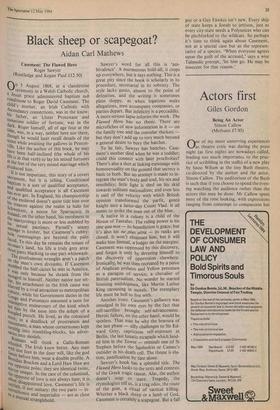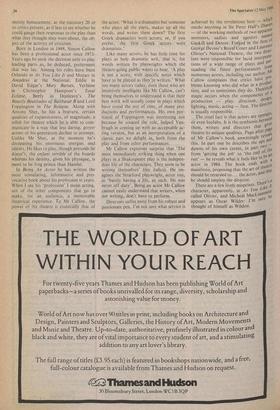Actors first
Giles Gordon
Being An Actor Simon Callow (Methuen £7.95)
Ore of my more unnerving experiences als theatre critic was during the press night (as first nights are nowadayS called, lending too much importance to the prac- tice of scribbling in the stalls) of a new play by Snoo Wilson at the tiny Bush theatre, co-directed by the author and the actor, Simon Callow. The auditorium of the Bush is such that if you choose to spend the even- ing watching the audience rather than the actors this may be done. Mr Callow spent most of the time looking, with expressions ranging from contempt to compassion but mostly bemusement, at the statutory 20 or so critics present, as if less to see whether he could gauge their responses to the play than what they thought they were about, the ob- ject of the activity of criticism.
Born in London in 1949, Simon Callow has been a professional actor since 1973. Years ago he took the decision only to play leading parts as, he deduced, preferment that way lay. Among his roles have been Orlando in As You Like It and Mozart in Amadeus at the National, Eddie in David Edgar's Mary Barnes, Verlaine in Christopher Hampton's Total Eclipse, Beefy in Donleavy's The Beastly Beatitudes of Balthasar B and Lord Foppington in The Relapse. Along with Antony Sher, he has a bravura, certain qualities of expansiveness, of magnitude, a relish for theatre which he is able to com- municate in a way that less daring, greyer actors of his generation decline to attempt. Unlike Mr Sher, at the moment he's dissipating his enormous energies and talents. He likes to play, though pretends he doesn't, the enfant terrible of the boards whereas his destiny, given his physique, is more to be frog prince than Hamlet.
In Being An Actor he has written the most stimulating, informative and pro- vocative book about his profession in years. When I say his 'profession' I mean acting, not of the other components that go to make, for an audience, a memorable theatrical experience. To Mr Callow, the power of the theatre is essentially that of
the actor. 'What is a dramatist but someone who plays all the parts, makes up all the words, and writes them down? The first Greek dramatists were actors; or, if you prefer, the first Greek actors were dramatists.'
Like many actors, he has little time for plays as holy dramatic writ, that is, for words written by playwrights which the theatre-going public wants to hear: 'A play is not a score, with specific notes which have to be played as they're written.' What too many actors today, even those who are intuitively intelligent like Mr Callow, can't bring themselves to understand is that their best work will usually come in plays which have stood the test of time, of many pro- ductions and performances. His own por- trayal of Foppington was interesting not because he created the role, helped Van- brugh in coming up with an acceptable ac ting version, but as an interpretation of a classic part we delight in, both from the play and from other performances.
Mr Callow expresses surprise that 'The most immediately striking thing when one plays in a Shakespeare play is the indepen- dent life of the characters. They seem to be writing themselves' (my italics). He im- agines the Stratford playwright, actor too, as 'barely having a life, as such. He was never off duty'. Being an actor Mr Callow cannot easily understand that writers, when not writing, don't have to perform.
Directors suffer most from his robust and passionate pen. I'm not sure what service is
The Spectator 12 May 1984 achieved by the revelations here — which outdo anything in Sir Peter Hall's Diaries — of the working methods of two apPare11,1 monsters, sadists and egotists panic"( Gaskill and Dexter. Forged in the fires of George Devine's Royal Court and Laurence Olivier's National Theatre, the two diree• tors were responsible for lucid interprets- dons of a wide range of plays and Per" suading the finest performances from numerous actors, including our author. Mr Callow complains that critics have PO- blems knowing who did what in a product lion, and so sometimes they do. Theatrical magic occurs when the components of a production lighting, music, acting acptliany;
is usually responsible.
The cruel fact is that actors are sponges' —fuse. The dticgt r(1);. or even loofahs. It is the symbiosis betweens them, writers and directors that give,, theatre its unique qualities. Page after page of Mr Callow's book unwittingly reveals this. In part one he describes the ups an downs of his own career, in part 1" from 'getting the job' to 'the end of the run' — he reveals what it feels like to be an actor in 1984. The book ends with manifesto, proposing that the art of theatrea should d en osuhlo bl d should returned the to... d . . rtehcet oarc.t actor, and that he There are a few lively misprints. There !t character, apparently, in As You Like.. called Olivier, and Micheal MacLiarnrrinhe appears as Oscar Wilder: pm sure " thought of himself as Wildest.







































 Previous page
Previous page